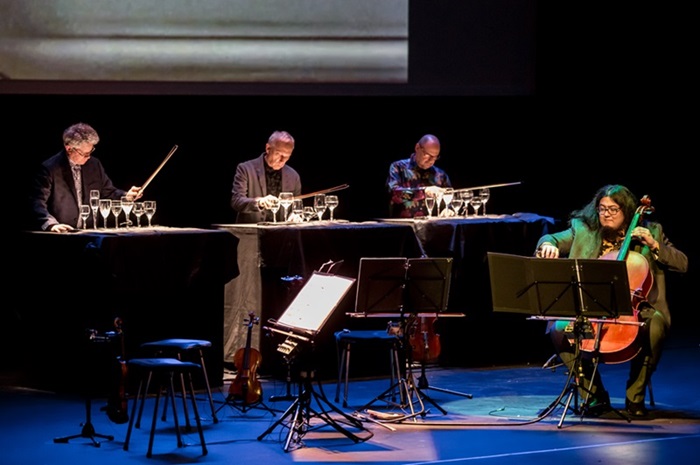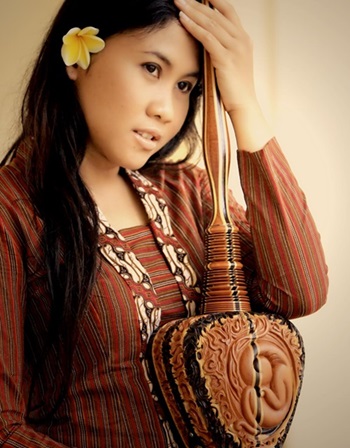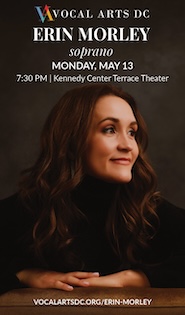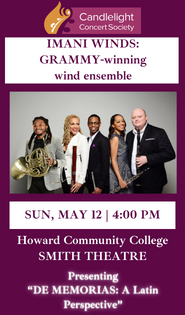Kronos Quartet marks golden anniversary by looking to future

Kronos Quartet plays George Crumb’s “God-music” in Guadalajara, Mexico. (Photo: Nación Imago)
On Saturday night Washington Performing Arts presented the Kronos Quartet in a recital celebrating the group’s 50th anniversary at Sixth & I Historic Synagogue. Comprised of violinists David Harrington and John Sherba, violist Hank Dutt, and cellist Paul Wiancko, the ensemble has come to occupy a singular perch over the years for their focus on the chamber music of the present. While featuring some nods to abiding collaborations and signature pieces, Saturday’s omnivorous program was no retrospective, choosing instead to emphasize new and recent works from the group’s extensive commissioning activities.
The first half opened with a movement from ZonelyHearts by Nicole Lizée. An irreverent riff on the Twilight Zone series, the piece incorporated both spoken dialogue using period phones on stage and, at one point, funny stick props instead of bows to play the instruments, making for a surprisingly effective evocation of the show’s odd and disorienting milieu.
The quartet next turned to a movement from Peni Candra Rini’s Segara Gunung, a searching exploration of nature drawing on elements of Javanese music. Rini, currently in residence at the University of Richmond, was able to join this D.C. performance in a remarkable demonstration of a specialized type of gamelan singing for female performers that blended beautifully with the strings.
This was followed by the electronic composer Jlin’s Maji, a work inspired by iconoclastic jazz musician Sun Ra, which arrays dense, punctuated figures in the quartet against a recorded backdrop of percussion. Despite some gripping writing for the strings, the live musicians and pre-recorded music never seemed to fully integrate, the live portions rendered somewhat lifeless by needing to hew to the track.
The group next played a 2022 arrangement of Bob Dylan’s “All Along the Watchtower,” drawing inspiration from the even better-known Jimi Hendrix recording of the song and continuing the quartet’s history of adapting Hendrix’s music. Jacob Garchik’s arrangement duly brought to life the passages inspired by Hendrix’s iconic guitar solos, which Harrington and Sherba tore into with abandon, but the straightforward setting of the verses generated little interest beyond the fleeting entertainment of hearing a string quartet play a popular music theme.
Wiancko, who joined the quartet’s long running line-up as its latest cellist earlier this year, was also the composer of the next work, Only Ever Us, a charming and intimate work that the quartet delivered with a delicate sense of interplay between the instruments. “God-music” from George Crumb’s Black Angels, followed, a seminal work for the group that it recorded in 1990. A respite from the terrifying sonic landscape of the larger piece, three members of the group played an impromptu glass harmonica with their bows against an ethereal melody in the cello.
The first half closed with the world premiere of Aleksandra Vrebalov’s Gold Came from Space, a captivating new work that brought the audience to its feet. Distorted string effects lingered over hurtling pizzicato figures and a frenzied building of tension to the briefest tonal breakthrough, followed by the unexpected coda of a gorgeous extended dirge featuring Dutt’s viola. Amongst a diverse field of intriguing offerings, this dynamic new work may have been the highlight.

Peni Candra Rini (Photo: Arief Budianto)
The second half opened with a recent work by Terry Riley, a composer with whom the quartet has enjoyed a long association. “Lunch in Chinatown,” from a longer work This Assortment of Atoms – One Time Only!, juxtaposed playful music for the strings with dialogue for the players capturing trivial snippets of conversation. Unfortunately, the bit could not maintain interest for nearly as long as the piece’s brief runtime.
What were likely the program’s two most unabashedly “accessible” works followed, beginning with the lush tonal minimalism of Vladamir Martynov’s The Beatitudes. It is easy to hear why this piece has been used successfully as film music, though it seemed inert in a standalone concert setting. The muddy sonic effect of the arrangement, with the quartet playing against their own recorded track, also made one wonder if an unamplified performance might have been able to elevate the slightly saccharine basic material. “Tusen Tankar,” an arrangement of a pretty Scandinavian folk song inspired by a recording from a contemporary Swedish folk band, fared better. If at times drifting dangerously close to Enya territory, the arrangement was enlivened by some harmonic messiness and fiddling flourishes from Harrington.
The program closed with Glorious Mahalia by Stacy Garrop, a multi-movement work that juxtaposes the quartet with snippets of historical recordings of Studs Terkel’s interviews with Mahalia Jackson. The opening movement was at its most convincing when the strings hauntingly embellished snippets of song sung by Jackson in the interview. The second and third movements had the quartet accompany Jackson as she described her life and the hypocrisy of segregation — angular, frenzied string writing perhaps expressing Jackson’s underlying emotions.
Yet these passages appeared to over-dramatize the thoughtful, plainspoken sentiments in the interviews and didn’t seem to develop much beyond the initial idea of contrast (levels also seemed slightly unbalanced, making the interview recording distractingly difficult to parse at times). The fourth movement had the quartet accompany a recording of Jackson singing her signature “Sometimes I Feel Like a Motherless Child,” fragments of the song weaving in and out in a powerful arrangement, though one wondered whether the part for string quartet might have been even more compelling as a standalone piece instead of having to compete with the real thing.
For encores, the quartet gave a simple arrangement of the song “God Shall Wipe All Tears Away,” by Antonio Haskell, offering another chance to appreciate Hank Dutt’s singing viola (and to pine for an opportunity to hear him unamplified). Finally, composer Peni Candra Rini rejoined the group for an arrangement of an Iranian lullaby.
Pianist Beatrice Rana returns to the Kennedy Center, playing music by Scriabin, Debussy, and Liszt 7:30 p.m. February 26. washingtonperformingarts.org



